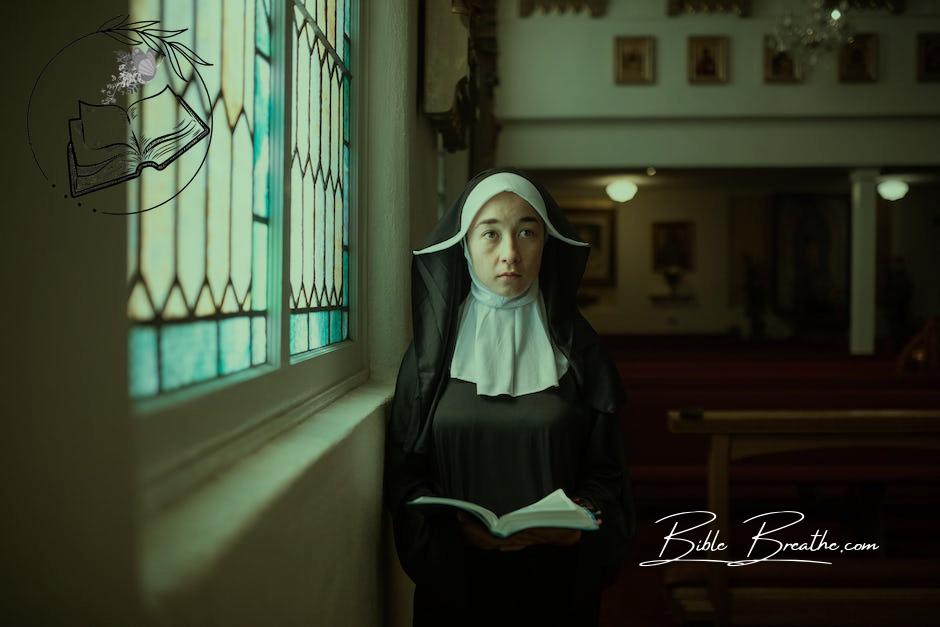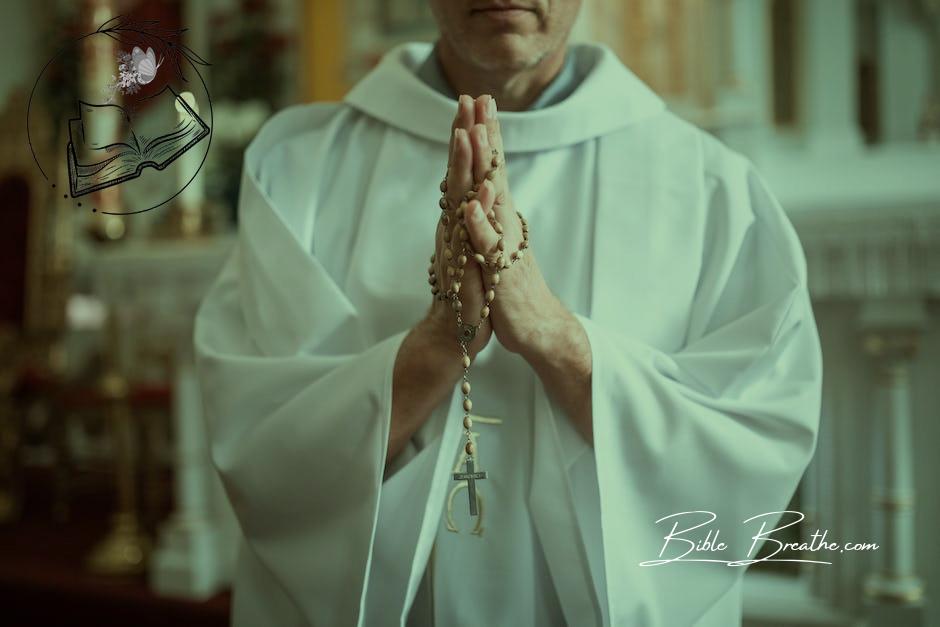So, fam, how’s Melchizedek connected to our Savior, Jesus?
This ain’t your average Bible study—it’s an exploration of biblical mysteries that’s gonna make your spirit jump like a praise break!
Alright, imagine this: Melchizedek, he’s like that hidden gem in the Old Testament, a king-priest from Salem, but low-key shrouded in mystery.
His name pops up, and you’re like, “Who’s this dude?” Well, get ready, ’cause we’re about to uncover the divine link to Jesus.
Back in the day, the Old Testament was lit with stories of Melchizedek, and he’s no ordinary character.
He’s all about righteousness and got that mysterious aura.
But hold up, this ain’t where the story ends.
Fast-forward to the New Testament, especially the book of Hebrews, and it’s like a lightbulb moment.
Melchizedek isn’t just a historical figure; he’s a foreshadowing of our Lord and Savior, Jesus Christ!
It’s a journey through redemptive history, weaving in covenants, the Messiah, and what it means to be truly righteous.
So, let’s dig deep into this divine connection between Melchizedek and Jesus.
It’s more than history; it’s a blessing for our souls, a revelation that’ll make you wanna shout “Hallelujah!” Can I get an amen, somebody?
🙌🏽🌟
Key Takeaways
- The connection between Melchizedek and Jesus is profound and significant. Melchizedek, a mysterious figure in the Old Testament, is described as both a king and a priest of God. His appearance in the life of Abraham in Genesis 14:18-20 foreshadows the role of Jesus as a priest-king.
- Jesus’ dual roles as king and priest are central to understanding His identity and mission. In the Old Testament, kings and priests were distinct roles, but Jesus combines them in a unique and powerful way. He is the King of kings and the High Priest who offers Himself as the perfect sacrifice for the forgiveness of sins.
- Jesus’ Melchizedekian priesthood has eternal implications for believers. It signifies that His priesthood is not limited by time or tradition but is based on an eternal, unchangeable order. This means that Jesus’ work of redemption is everlasting and continues to intercede on behalf of believers.
- Exploring the connection between Melchizedek and Jesus deepens our understanding of the Old Testament’s anticipation of the Messiah and the New Testament’s revelation of His fulfillment. It underscores the uniqueness and universality of Jesus’ role as the ultimate Priest-King, offering salvation and eternal life to all who believe in Him.
The Remarkable Connection Between Melchizedek and Jesus

Photo modified by BibleBreathe.com. Original photo by RDNE Stock project on Pexels
In this captivating journey through the pages of the Bible, we come across a truly intriguing character – Melchizedek.
You might be asking, “How does Melchizedek relate to Jesus?” Well, my friends, let’s dive into the Scriptures and explore this divine connection step by step.
Melchizedek: The Enigmatic King-Priest of Salem
Our adventure begins in the ancient city of Salem, where Melchizedek held a unique position as both a king and a priest.
Picture Salem as a place where righteousness and worship flowed together like a crystal-clear river.
Melchizedek’s role was extraordinary, for he not only wore the crown of a king but also carried the mantle of priesthood.
“”And Melchizedek king of Salem brought forth bread and wine: and he was the priest of the most high God.”” – Genesis 14:18 (KJV)
Here, my friends, we discover the first connection.
When Melchizedek offered bread and wine, it was a glimpse of something profound we encounter later in the New Testament – the sacrament of communion.
In this sacred act, the bread symbolizes the body of Christ, and the wine represents His blood.
Melchizedek’s Significance in the Tapestry of Redemption
Now, let’s fast forward to the New Testament, specifically to the book of Hebrews.
In Hebrews 7, we stumble upon a breathtaking revelation.
The author, inspired by the Holy Spirit, draws parallels between Melchizedek and Jesus.
Unlike the Levitical priesthood, which was tied to lineage and law, Melchizedek’s priesthood stands as a timeless symbol of an eternal priesthood.
“”For this Melchizedek, king of Salem, priest of the most high God, who met Abraham returning from the slaughter of the kings, and blessed him; to whom also Abraham gave a tenth part of all; first being by interpretation King of righteousness, and after that also King of Salem, which is, King of peace.”” – Hebrews 7:1-2 (KJV)
Here, the names “King of righteousness” and “King of peace” ascribed to Melchizedek mirror the attributes of Jesus, the Messiah – the true King of righteousness and the Prince of Peace.
The Covenant Connection
You might be wondering about the covenant – that sacred pact between God and His people.
In Psalm 110, we glimpse yet another facet of this profound relationship.
The Lord declares to the Messiah, often linked to the line of David:
“”The Lord hath sworn, and will not repent, Thou art a priest for ever after the order of Melchizedek.”” – Psalm 110:4 (KJV)
In this divine oath, we witness the continuity of the priesthood, not following the Levitical order but the timeless order of Melchizedek.
It’s as if God Himself orchestrated this connection between Melchizedek and Jesus to emphasize the eternal nature of His redemptive plan.
So, my friends, as we unravel the historical importance of Melchizedek, we find a tapestry beautifully woven with threads from the Old and New Testaments.
This tapestry ultimately leads us to the profound truth that Melchizedek foreshadowed the ultimate High Priest – Jesus Christ, the King of righteousness, and the source of our peace.
Melchizedek: A Divine Connection to Jesus

Photo modified by BibleBreathe.com. Original photo by Andrea Piacquadio on Pexels
Hey there, friends!
Today, we’re going to embark on a fascinating journey into the connection between Melchizedek and Jesus, a connection that’s as deep as it is meaningful in the grand story of the Bible.
Breaking Bread with a King-Priest
Imagine this scene: Abram, fresh from a victorious battle, crosses paths with Melchizedek, the king-priest of Salem.
What unfolds next is nothing short of extraordinary.
Melchizedek, a mysterious figure, doesn’t just exchange pleasantries; he offers Abram a divine meal – bread and wine.
“And Melchizedek king of Salem brought forth bread and wine: and he was the priest of the most high God.” – Genesis 14:18 (KJV)
Now, here’s the kicker: Melchizedek’s act of offering bread and wine isn’t your ordinary hospitality.
It carries deep symbolism.
Jump forward to the New Testament, and we witness Jesus Himself, on the night before His crucifixion, establishing the sacred tradition of communion, using bread and wine to represent His body and blood.
Do you see the connection here?
Melchizedek’s offering was a foreshadowing of this sacred ritual, linking the Old Testament to the Gospel message.
The Significance of Abram’s Tithe
Abram’s response to Melchizedek’s blessing holds immense importance.
He offers Melchizedek a tithe, a tenth of the spoils of war.
In the grand tapestry of the Bible, tithing holds a special place – it’s an act of worship and a way of recognizing God’s provision.
Abram’s tithe to Melchizedek, this king-priest of Salem, goes beyond mere generosity.
It symbolizes his acknowledgment of Melchizedek’s spiritual authority and preeminence.
“And blessed be the most high God, which hath delivered thine enemies into thy hand. And he gave him tithes of all.” – Genesis 14:20 (KJV)
Think of it like this: Abram, by giving a tenth of his spoils, acknowledges that Melchizedek serves as a bridge between earthly victories and heavenly blessings, much like Jesus bridges the gap between humanity’s sin and God’s salvation.
Connecting the Dots to Communion
Now, let’s weave these threads together.
Melchizedek’s offering of bread and wine, Abram’s tithe, and Jesus’ institution of communion – they are all interconnected.
The bread represents Christ’s body, broken for us, and the wine symbolizes His blood shed for our sins.
In Melchizedek’s time, this ritual hinted at the ultimate sacrifice to come, and Abram’s tithe foreshadowed the heart of worship, where we honor the King of righteousness and recognize His priesthood.
So, my friends, as we dive into the interaction between Melchizedek and Abram, we uncover not only a historical event but a divine masterpiece painted across time.
It reveals how Melchizedek and Jesus are intertwined through the threads of sacrifice, communion, and a glimpse into God’s eternal plan for our salvation.
Isn’t that awe-inspiring?
Decoding the Prophetic Psalm: Understanding the Link Between Melchizedek and Jesus

Photo modified by BibleBreathe.com. Original photo by Walls.io on Pexels
Psalm 110, my dear friends, is like a treasure chest overflowing with prophetic wisdom.
Hidden within its verses is a profound revelation about how Melchizedek and Jesus are intertwined.
This psalm isn’t your run-of-the-mill passage; it’s the most frequently quoted one in the New Testament.
Let’s dive into its significance and unearth the precious gems it holds.
The Most Quoted Psalm
Have you ever stopped to wonder why Psalm 110 gets so much attention?
Well, it’s because this particular psalm paints a vivid picture of a future king.
But not just any king – we’re talking about a king of unmatched honor, power, and authority.
This king isn’t bound by human lineage or the limitations of this world; he’s a divine figure with cosmic significance.
“The Lord said unto my Lord, Sit thou at my right hand, until I make thine enemies thy footstool.” – Psalm 110:1 (KJV)
Now, here’s where it gets intriguing.
In the New Testament, guided by the Holy Spirit, this verse is quoted repeatedly to emphasize Jesus’ divine authority.
The “Lord” mentioned here is none other than God the Father, and the “my Lord” refers to Jesus Himself.
This verse underscores Jesus’ exalted position at the right hand of God – a position that no mere mortal could attain.
The Messianic Figure
But there’s more to Psalm 110.
It introduces us to a messianic figure who isn’t just a king but also a priest.
And here’s the kicker – this priesthood isn’t following the traditional Levitical order; it’s in the order of Melchizedek.
“The Lord hath sworn, and will not repent, Thou art a priest for ever after the order of Melchizedek.” – Psalm 110:4 (KJV)
In this declaration, we see history and prophecy beautifully intertwined.
The promise of an eternal priesthood, one that goes beyond earthly constraints, is fulfilled in Jesus.
He, like Melchizedek, serves as both a king and a priest.
This isn’t a mere coincidence; it’s a divine design that connects the dots between the Old Testament and the New Testament, between the earthly and the heavenly.
A Davidic Dynasty
Furthermore, Psalm 110 alludes to a Davidic dynasty.
It speaks of the Messiah’s rule amidst his enemies and his kingship extending from Zion.
This aligns perfectly with the biblical portrayal of Jesus as the Son of David, the promised Messiah who establishes an everlasting kingdom.
So, my dear friends, as we unravel the mystery of Psalm 110, we see it as a radiant beacon, illuminating the connection between Melchizedek and Jesus.
It foretells the arrival of a king-priest who transcends the limitations of earthly priesthood – a king who reigns in righteousness and a priest who offers salvation to all.
In Jesus, we find the fulfillment of this majestic psalm, and in Melchizedek, we catch a glimpse of the ancient foreshadowing of this divine reality.
Melchizedek and Jesus: Unveiling a New Testament Revelation

Photo modified by BibleBreathe.com. Original photo by RDNE Stock project on Pexels
Hey there, my friends!
Today, we’re about to dive into something truly remarkable – the connection between Melchizedek and Jesus, and trust me, it’s not just confined to the pages of the Old Testament.
The New Testament reveals a perspective that shines a whole new light on this profound relationship.
Melchizedek: A Glimpse of the Pre-Incarnate Christ
Imagine this: Melchizedek isn’t just a historical figure; he’s a glimpse of the pre-incarnate Christ.
Yes, you heard that right!
Before Jesus walked the dusty roads of Judea, He existed in the divine realm, and Melchizedek serves as a sneak peek of His eternal priesthood.
Now, why is this a big deal?
Well, Melchizedek, much like Jesus, held the dual roles of king and priest.
He symbolized righteousness and peace, foreshadowing the Messiah who would bring these very qualities to the world.
“Thou art a priest for ever after the order of Melchizedek.” – Hebrews 7:17 (KJV)
Melchizedek becomes the bridge connecting the Old and New Testaments, the earthly and the divine, showcasing the unbroken thread of God’s redemptive plan.
Jesus: The Ultimate King of Righteousness and Peace
Now, let’s shift our focus to Jesus.
In the book of Hebrews, we encounter a powerful comparison.
Jesus is hailed as the true King of righteousness and peace, surpassing not only earthly kings but also the Levitical priesthood established under the Mosaic law.
“For this Melchizedek, king of Salem, priest of the most high God, who met Abraham returning from the slaughter of the kings, and blessed him; to whom also Abraham gave a tenth part of all; first being by interpretation King of righteousness, and after that also King of Salem, which is, King of peace.” – Hebrews 7:1-2 (KJV)
Jesus’ righteousness and peace aren’t limited by worldly boundaries; they extend into the heavenly realms.
He is the ultimate fulfillment of Melchizedek’s dual role, and His priesthood is eternal, transcending the limitations of the Levitical priesthood.
The Supreme Nature of Jesus’ Priesthood
Let’s take a moment to ponder this: Jesus’ priesthood, in the order of Melchizedek, stands head and shoulders above the Levitical priesthood.
Why, you ask?
Well, the Levitical priests were mortal, susceptible to sin, and had to offer sacrifices repeatedly.
Jesus, on the other hand, is sinless and eternal.
He offered Himself as the perfect sacrifice once and for all, reconciling humanity with God.
“But this man, because he continueth ever, hath an unchangeable priesthood. Wherefore he is able also to save them to the uttermost that come unto God by him, seeing he ever liveth to make intercession for them.” – Hebrews 7:24-25 (KJV)
Jesus’ eternal priesthood ensures our salvation because He lives on to intercede on our behalf.
This, my friends, is the heart of the Gospel.
The Eternal Impact
So, what does all this mean for us?
It means our salvation is rock-solid, we have a High Priest who empathizes with our weaknesses, and His sacrifice grants us everlasting peace and righteousness.
In conclusion, as we explore the New Testament perspective on Melchizedek and Jesus, we witness a seamless connection between the Old and New Covenants, between history and divinity.
Melchizedek, the mysterious figure, points us to the eternal reality of Jesus, the ultimate King of righteousness and peace, whose priesthood offers us salvation and an eternal bond with our Creator.
How incredible is that?
Melchizedek and Jesus: A Message of Hope for Believers

Photo modified by BibleBreathe.com. Original photo by Andrea Piacquadio on Pexels
As we dive into the deep connection between Melchizedek and Jesus, let’s remember that this relationship holds powerful implications for believers like you and me.
It’s not just a topic of history or theology; it’s a wellspring of comfort, assurance, and a divine calling.
Finding Comfort and Assurance in Jesus’ Dual Roles
Picture this: Jesus, our High Priest in the order of Melchizedek, gracefully carries the dual mantles of both king and priest.
What does this mean for believers?
It means that we have a Savior who not only reigns with unmatched power and authority but also intercedes for us with boundless compassion and understanding.
In moments of doubt or fear, take solace in knowing that Jesus, the King of righteousness, occupies the throne, and He is also the Prince of Peace who offers soothing balm to our troubled souls.
“Seeing then that we have a great high priest, that is passed into the heavens, Jesus the Son of God, let us hold fast our profession. For we have not an high priest which cannot be touched with the feeling of our infirmities; but was in all points tempted like as we are, yet without sin.” – Hebrews 4:14-15 (KJV)
This dual role assures us that we can boldly approach God, secure in the knowledge that our Savior understands our struggles and is always ready to extend grace and mercy.
The Calling of the Melchizedekian Priesthood
But there’s more to this story.
The Melchizedekian connection beckons believers to a higher calling.
Just as Melchizedek served as both king and priest, we are summoned to a life of righteousness and spiritual priesthood.
“But ye are a chosen generation, a royal priesthood, an holy nation, a peculiar people; that ye should shew forth the praises of him who hath called you out of darkness into his marvellous light.” – 1 Peter 2:9 (KJV)
Believers are called to be a royal priesthood, offering up spiritual sacrifices and proclaiming the excellencies of our Savior.
We are tasked with bridging the earthly and the divine, sharing the message of salvation and peace found in Jesus Christ.
Embracing the Blessing
In conclusion, the implications of the Melchizedek-Jesus connection are profound and full of hope for believers.
We discover comfort and assurance in the dual roles of our Savior, and we are summoned to embrace the Melchizedekian calling – to live lives of righteousness and spiritual priesthood.
In doing so, we become vessels of blessing, sharing the eternal message of salvation and communion with our Heavenly King of righteousness and peace.
Frequently Asked Questions (FAQs) About How Is Melchizedek Related To Jesus
Who exactly was Melchizedek in the Old Testament?
Melchizedek, an enigmatic figure, appears in Genesis 14.
He was both a king and a priest, a foreshadowing of Christ.
Melchizedek blessed Abraham, who gave him a tithe.
He symbolizes Christ’s priesthood, transcending the Levitical priesthood, and his identity remains a subject of biblical mystery.
How does Melchizedek’s priesthood differ from the Levitical priesthood?
Melchizedek’s priesthood, as seen in Genesis 14 and Hebrews 7, is unique because it predates the Levitical priesthood and is not limited by genealogy or law.
It symbolizes Christ’s eternal priesthood.
In contrast, the Levitical priesthood was based on the Law of Moses and had specific rules and regulations.
Why is Melchizedek’s interaction with Abram significant?
Melchizedek, a mysterious figure in the Bible, blessed Abram and symbolizes a priesthood superior to the Levitical priesthood.
His meeting with Abram highlighted God’s authority beyond cultural or ethnic boundaries, signifying a unique priesthood and foreshadowing Christ’s eternal priesthood, separate from lineage or law.
How does the writer of Hebrews view Melchizedek in relation to Jesus?
The writer of Hebrews draws parallels between Melchizedek and Jesus, highlighting Melchizedek’s priesthood as a precursor to Christ’s eternal priesthood.
Hebrews 7 underscores the superiority of Jesus’ priesthood over the Levitical system, emphasizing the unchanging and everlasting nature of Christ’s role as the ultimate High Priest.
Matt Turner
I’m Matt, and I love breaking down Bible verses in a way that’s easy to understand and apply to everyday life. My goal is to help you connect with God’s Word and find practical ways to live it out. Whether you’re new to the Bible or just looking for some fresh insights, I’m here to walk with you and share what I’ve learned along the way.

